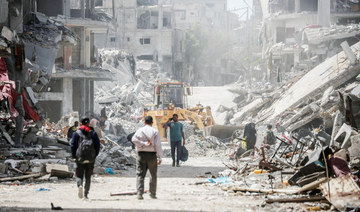COPENHAGEN: Denmark said on Friday it welcomed a British government proposal for a European-led naval mission to ensure safe shipping through the Strait of Hormuz and would consider a military maritime contribution.
Britain has sought to assemble the mission in Hormuz, used by tankers carrying about a fifth of the world’s oil, following Iran’s seizure of a British-flagged ship in what London said was an act of “state piracy.”
The initiative won initial support from Denmark, France and Italy, three senior diplomats said on Tuesday.
“The Danish government looks positively toward a possible contribution to such initiative,” Foreign Minister Jeppe Kofod said in a statement. “The initiative will have a strong European footprint.”
The backing contrasts with a lukewarm response shown by European allies to a similar American call first voiced at NATO in late June, which was resisted by France and Germany. They worried the US-led military alliance would be dragged into a possible confrontation with Iran.
EU-member Denmark is among the world’s biggest seafaring nations and home to the world’s biggest container shipping firm A.P. Moller-Maersk, which sails in the high-tension area.
“The Royal Danish Navy is strong and capable and would be able to contribute actively and effectively to this type of engagement,” said Danish Defense Minister Trine Bramsen.
A final decision would still need to be discussed in parliament.
Denmark backs Britain’s proposed Hormuz naval mission
Denmark backs Britain’s proposed Hormuz naval mission

- Britain has sought to assemble the mission in Hormuz following Iran’s seizure of a British-flagged ship
- The initiative won initial support from Denmark, France and Italy, three senior diplomats said on Tuesday
Israel military strikes northern Gaza in heaviest shelling in weeks
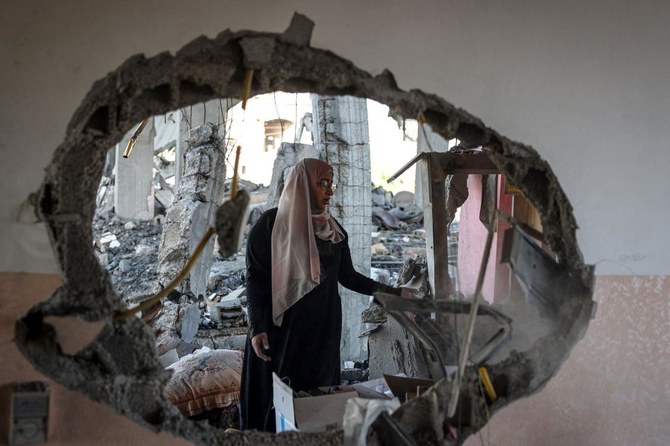
Army tanks made a new incursion east of Beit Hanoun on the northern edge of the Gaza Strip, though they did not penetrate far into the city, residents and Hamas media said. Gunfire reached some schools where displaced residents were sheltering.
In Israel, where government offices and businesses were shut to celebrate the Jewish Passover holiday, incoming rocket alerts sounded in southern border towns, although no casualties were reported.
The armed wing of Islamic Jihad, a group allied to Hamas, claimed responsibility for the rocket attacks on Sderot and Nir Am, indicating fighters were still able to launch them almost 200 days into the war, which has flattened large swathes of the enclave and displaced almost all of its 2.3 million people.
Thick black smoke could be seen rising in northern Gaza from across the southern Israeli border. Shelling was intense east of Beit Hanoun and Jabalia and continued on Tuesday morning in areas such as Zeitoun, one of Gaza City’s oldest suburbs, with residents reporting at least 10 strikes in a matter of seconds along the main road.
Just west of Beit Hanoun in Beit Lahiya, medics and Hamas media said strikes had hit a mosque and a crowd gathering on the coastal road to collect aid dropped from the air. Reuters could not immediately confirm those targets.
“It was one of those nights of horror that we had lived in at the start of the war. The bombing from tanks and planes didn’t stop,” said Um Mohammad, 53, a mother-of-six living 700 meters from Zeitoun.
“I had to gather with my children and my sisters who came to shelter with me in one place and pray for our lives as the house kept shaking,” she told Reuters via a chat app.
“I don’t know if we will make it alive before this war stops,” she added.
The Israeli army said rockets launched overnight into Israel had come from firing positions in northern Gaza. It had struck rocket launchers and killed several militants overnight, in what it called “targeted and precise” strikes.
“Over the past day, IAF fighter jets and additional aircraft struck approximately 25 terror targets throughout the Gaza Strip, including military infrastructure, observation posts, terrorists, launch posts,” it said in a statement.
Hitting areas where troops had withdrawn
The renewed shelling and bombing of northern Gaza comes almost four months after the Israeli army announced it was drawing down its troops there, saying Hamas no longer controlled those areas.
This month, Israel also drew down most of its forces in southern Gaza. But efforts to reach a ceasefire have failed, and Israeli bombardment and raids on territory where its troops have withdrawn are making it difficult for displaced Gazans to return to abandoned homes. Israel also struck Khan Younis in the south on Tuesday, a day after tanks raided eastern parts of that city.
Israel says it is seeking to eradicate Hamas, which controls the enclave, following an attack by the militant group on Oct. 7, killing 1,200 and taking 253 hostages by Israeli tallies.
Across the Gaza Strip, Israel’s military strikes killed 32 Palestinians and wounded 59 others in the past 24 hours, Palestinian health authorities said. They say more than 34,000 people have been confirmed killed in the seven-month war, with thousands more bodies as yet unrecovered.
Residents also reported bombing east of Deir Al-Balah on Tuesday in a central zone separating the north from the south.
In Nasser Hospital, southern Gaza’s main health facility, authorities recovered a further 35 bodies from what they say is one of at least three mass graves found at the site, taking the total found there to 310 in one week.
Israel says it was forced to battle inside hospitals because Hamas fighters operated there, which medical staff and Hamas deny.
Tent compound rises in Khan Younis as Israel prepares for Rafah offensive
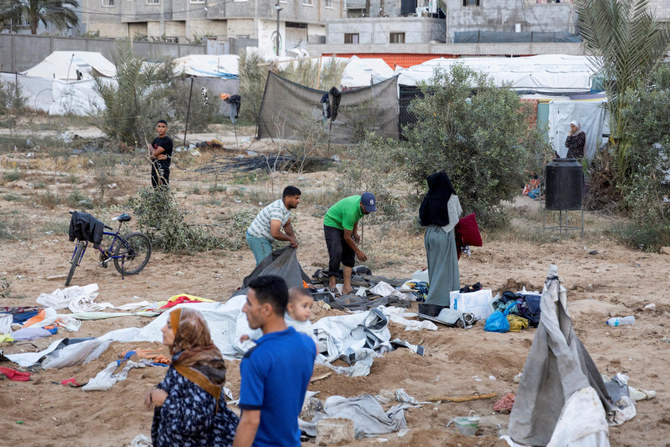
- Israel has said it plans to evacuate civilians from Rafah during an anticipated offensive on the southern city
- The Israel-Hamas war has killed more than 34,000 Palestinians
The tent construction is near Khan Younis, which has been targeted by repeated Israeli military operations over recent weeks. Israel has said it plans to evacuate civilians from Rafah during an anticipated offensive on the southern city, where hundreds of thousands of people have taken refuge during the war, now in its seventh month.
Also Monday, a failed rocket strike was launched at a base housing US-led coalition forces at Rumalyn, Syria, marking the first time since Feb. 4 that Iranian-backed militias have attacked a US facility in Iraq or Syria, a US defense official said. No personnel were injured in the attack, and no group has claimed responsibility for the attack.
The conflict has sparked regional unrest pitting Israel and the US against Iran and allied militant groups across the Middle East. Israel and Iran traded fire directly this month, raising fears of all-out war.
The war was sparked by the unprecedented Oct. 7 raid into southern Israel in which Hamas and other militants killed around 1,200 people, mostly civilians, and abducted around 250 hostages. Israel says militants are still holding around 100 hostages and the remains of more than 30 others.
The Israel-Hamas war has killed more than 34,000 Palestinians, according to local health officials, at least two-thirds of them children and women. It has devastated Gaza’s two largest cities and left a swath of destruction. Around 80 percent of the territory’s population have fled to other parts of the besieged coastal enclave.
The US House of Representatives approved a $26 billion aid package on Saturday that includes around $9 billion in humanitarian assistance for Gaza, which experts say is on the brink of famine, as well as billions for Israel. The US Senate could pass the package as soon as Tuesday, and President Joe Biden has promised to sign it immediately.
Iran’s foreign minister calls EU sanctions ‘regrettable’
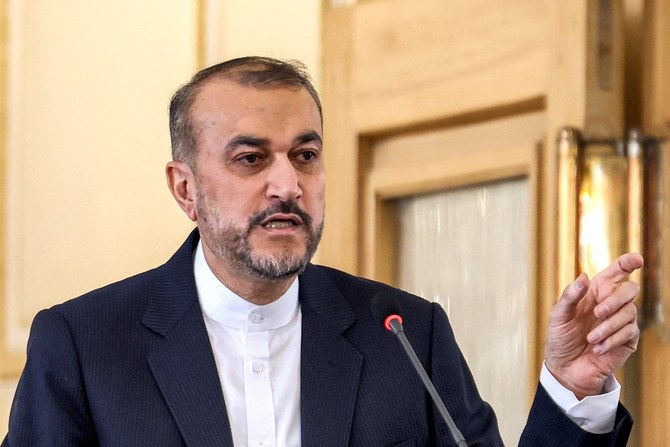
- EU foreign ministers agreed in principle to expand sanctions on Iran by agreeing to extend restrictive measures on Tehran’s weapons exports
DUBAI: European Union sanctions announced following Iran’s attack against Israel are “regrettable” because the country was acting in self-defense, Iran’s Foreign Minister Hossein Amirabdollahian posted on X on Tuesday.
Iran launched more than 300 drones and missiles on Israel in what it said was retaliation against a suspected Israeli bombing of its embassy compound in Damascus.
On Monday, EU foreign ministers agreed in principle to expand sanctions on Iran by agreeing to extend restrictive measures on Tehran’s weapons exports of any drone or missile to Iranian proxies and Russia.
“It is regrettable to see the EU deciding quickly to apply more unlawful restrictions against Iran just because Iran exercised its right to self-defense in the face of Israel’s reckless aggression,” Amirabdollahian said on X, before calling on the EU to apply sanctions on Israel instead.
More work will need to follow in Brussels to approve a legal framework before the expansion of the sanctions can take effect.
Israel’s Gaza war has negatively impacted human rights, says US report

- Rights issues include credible reports of unlawful killings, enforced disappearances and torture, says report
- Israeli military's conduct has come under scrutiny as its forces have killed over 34,000 in Gaza since Oct. 7
WASHINGTON: The war between Israel and Hamas that has killed tens of thousands of Palestinians in Gaza and resulted in a severe humanitarian crisis has had “a significant negative impact” on the human rights situation in the country, the US State Department said in its annual report on Monday.
Significant human rights issues include credible reports of arbitrary or unlawful killings, enforced disappearance, torture and unjustified arrests of journalists among others, said the State Department’s 2023 Country Reports on Human Rights Practices.
The report added that the Israeli government has taken some credible steps to identify and punish the officials who may have been involved in those abuses.
Israel’s military conduct has come under increasing scrutiny as its forces have killed 34,000 Palestinians in Gaza, according to the enclave’s health authorities, many of them civilians and children. The Israeli-occupied Gaza Strip has been reduced to a wasteland, and extreme food shortages have prompted fears of famine.
Israel launched its assault in response to a Hamas attack on Oct. 7, in which Israel says 1,200 people were killed.
Rights groups have flagged numerous incidents of civilian harm during the Israeli army’s offensive in Gaza, as well as raised alarm about rising violence in the Israeli-occupied West Bank, where Palestinian Health Ministry records show Israeli forces or settlers have killed at least 460 Palestinians since Oct. 7. But so far the Biden administration has said it has not found Israel in breach of international law.
Washington gives $3.8 billion in annual military assistance to its longtime ally. Leftist Democrats and Arab American groups have criticized the Biden administration’s steadfast support for Israel, which they say provides it with a sense of impunity.
But this month, President Joe Biden for the first time threatened to condition support for Israel, and insisted that it take concrete steps to protect humanitarian aid workers and civilians.
Israel’s Gaza war has negatively impacted human rights, says US report
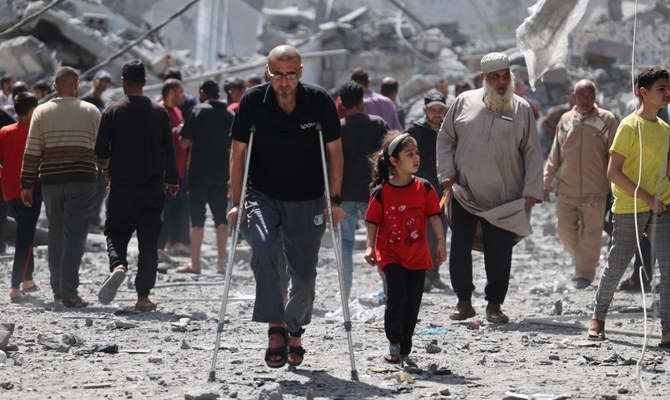
- The Israeli-occupied Gaza Strip has been reduced to a wasteland, and extreme food shortages have prompted fears of famine
WASHINGTON: The war between Israel and Hamas that has killed tens of thousands of Palestinians in Gaza and resulted in a severe humanitarian crisis has had “a significant negative impact” on the human rights situation in the country, the US State Department said in its annual report on Monday.
Significant human rights issues include credible reports of arbitrary or unlawful killings, enforced disappearance, torture and unjustified arrests of journalists among others, said the State Department’s 2023 Country Reports on Human Rights Practices.
The report added that the Israeli government has taken some credible steps to identify and punish the officials who may have been involved in those abuses.
Israel’s military conduct has come under increasing scrutiny as its forces have killed 34,000 Palestinians in Gaza, according to the enclave’s health authorities, many of them civilians and children. The Israeli-occupied Gaza Strip has been reduced to a wasteland, and extreme food shortages have prompted fears of famine.
Israel launched its assault in response to a Hamas attack on Oct. 7, in which Israel says 1,200 people were killed.
Rights groups have flagged numerous incidents of civilian harm during the Israeli army’s offensive in Gaza, as well as raised alarm about rising violence in the Israeli-occupied West Bank, where Palestinian Health Ministry records show Israeli forces or settlers have killed at least 460 Palestinians since Oct. 7. But so far the Biden administration has said it has not found Israel in breach of international law.
Washington gives $3.8 billion in annual military assistance to its longtime ally. Leftist Democrats and Arab American groups have criticized the Biden administration’s steadfast support for Israel, which they say provides it with a sense of impunity.
But this month, President Joe Biden for the first time threatened to condition support for Israel, and insisted that it take concrete steps to protect humanitarian aid workers and civilians.








